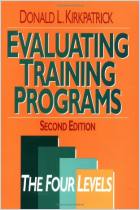
Transferring Learning to Behavior
Using the Four Levels to Improve Performance
Recommendation
In many companies, employees run from one training seminar to the next. That’s because executives hire high-powered consultants who recommend training programs to improve performance and bolster profits. However, without the proper philosophical approach and practical execution, training can have negligible bottom-line results and the only one who really profits is the consultant. More than 10 years ago, author Don Kirkpatrick wrote a groundbreaking book on the "four levels" of training evaluation. This time, Kirkpatrick and his son, James, have collaborated on a book that will help any company maximize the results of its training program. If writing big checks to consultants for minimal results is your idea of fun, don’t read any further. But if, like most executives, you believe in getting a healthy return on your training investment, getAbstract highly recommends this concrete approach.
Summary
About the Authors
Donald L. Kirkpatrick, Ph.D, professor emeritus at the University of Wisconsin, is the author of Evaluating Training Programs: The Four Levels. James D. Kirkpatrick, Ph.D., is a consultant for evaluation services.















Comment on this summary